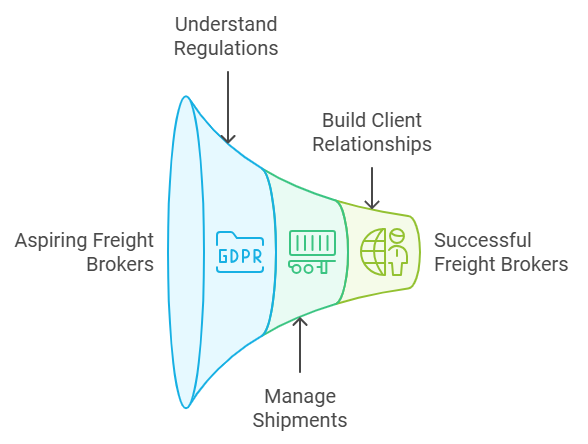Table of Contents
- Introduction
- Why Take a Freight Agent Online Course?
- Key Skills You’ll Learn
- Best Online Courses for Freight Agents
- Steps to Becoming a Freight Agent
- Career Opportunities and Earning Potential
- How to Get Started
- Final Thoughts
Why Take a Freight Agent Online Course?
The logistics industry is a trillion-dollar market, and becoming a freight agent is a smart way to enter without the high costs of running a brokerage. A freight agent online course provides structured training, flexibility, and the industry knowledge needed to succeed.
Many aspiring freight professionals choose online training because it allows them to learn at their own pace while maintaining a full-time job. With the rise of remote work, freight agents can operate from anywhere, making this an excellent career choice for those seeking financial independence and flexibility.
Key Skills You’ll Learn
A freight agent online course equips you with the essential skills needed to thrive in the logistics industry. Some of the critical skills covered include:
✅ Freight Brokerage Operations – Learn how freight moves across the supply chain.
✅ Sales and Negotiation Techniques – Master how to find and close deals with shippers and carriers.
✅ Load Booking and Carrier Relations – Understand how to build strong relationships with carriers.
✅ Legal and Compliance Requirements – Stay compliant with FMCSA regulations and industry best practices.
✅ Technology and Software Training – Get hands-on experience with TMS (Transportation Management Systems).
With these skills, you can confidently work as a freight agent or even consider starting your own freight brokerage in the future.
Best Online Courses for Freight Agents
There are several high-quality freight agent online courses available, but choosing the right one is essential. Some of the best options include:
- Freight Brokers Course – A self-paced online program covering all aspects of freight agent training, including licensing and operations.
- LoadTraining – Offers hands-on experience with live freight agents and real-time load booking.
- Brooke Training – Provides a comprehensive freight broker and agent course with financing options.
Before enrolling, ensure the course includes certification, ongoing support, and real-world applications to maximize your learning experience.
Steps to Becoming a Freight Agent
- Complete a Freight Agent Online Course – Enroll in a reputable training program to learn the fundamentals.
- Obtain Industry Certifications – While not mandatory, certifications help establish credibility.
- Partner with a Licensed Freight Broker – Freight agents work under a licensed broker to legally operate.
- Build a Network of Shippers and Carriers – Strong relationships lead to consistent business.
- Use Freight Technology & Software – Learn to manage loads efficiently with modern tools.
- Market Your Services – Utilize digital marketing, networking, and cold calling to grow your business.
Career Opportunities and Earning Potential
Freight agents can work independently or for established freight brokerages. The earning potential varies depending on experience, industry connections, and workload.
💰 Freight Agent Salary Estimates:
- Entry-Level: $40,000 – $60,000/year
- Experienced Agents: $75,000 – $150,000/year
- Top Earners: $200,000+ (commission-based)
Freight agents typically earn a commission per booked load, which can range from 10% to 30% of the broker’s fee. This means the more loads you book, the more you earn.
How to Get Started
Getting started as a freight agent is simple when you have the right training and resources.
📌 Step 1: Choose a reputable freight agent online course.
📌 Step 2: Complete the training and gain industry knowledge.
📌 Step 3: Partner with a licensed freight broker to start working.
📌 Step 4: Build your shipper and carrier network.
📌 Step 5: Start booking freight and earning commissions.
Final Thoughts
A freight agent online course is your gateway to a profitable and flexible career in the logistics industry. Whether you’re new to transportation or looking for a work-from-home opportunity, this career path offers financial independence and unlimited earning potential.
Growth + Change = Opportunity!











